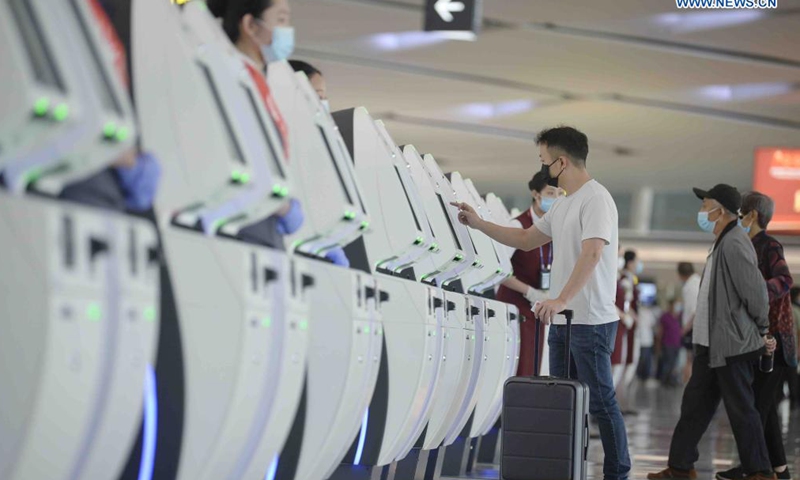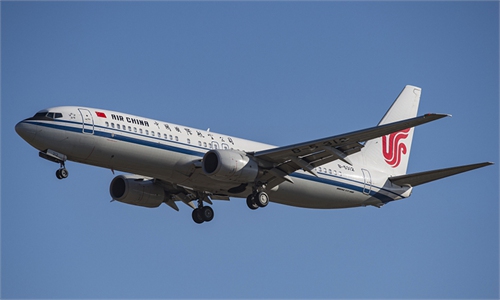Using 5G in Chinese aircraft will not affect wireless services, official said, after US airlines’ chaos

Passengers check in at the Chengdu Tianfu International Airport in Chengdu, southwest China's Sichuan Province, June 27, 2021. (Xinhua)
China's technological innovation will not come at the cost of sacrificing safety, China's civil aviation regulator said on Friday, noting the deployment of 5G in aviation will not affect aircraft wireless services.
The comment came after US telecom operators and airlines recently debated 5G deployments near airports, with the country's major passenger and cargo airlines arguing that when new 5G services come online in the US, the C-band signals may interfere with sensitive instruments such as wireless services on some aircraft, which can seriously disrupt flight operations.
The application of 5G in civil aviation in China adopts a combination of safety and non-safety communications according to different scenarios, which is different from the daily 5G network used on phones, Chen Xiangyang, an official from the Civil Aviation Administration of China (CAAC) said at the routine conference on Friday.
For security communications, such as aviation 5G, is completely isolated from the 5G network deployed by telecom operators, and there is no sharing relationship between the two, he added.
"Aviation 5G in China will not happen like in the US, and any technological innovation in civil aviation will not come at the cost of sacrificing or weakening safety," Chen said.
5G AeroMACS, the core technology of aviation 5G, has several important features, such as it is based on the civil aviation network and frequencies, and meets the requirements of aviation safety communications, which means the frequency should be separated from other public services, and the network should be strictly isolated from the public network, Chen explained.
By rationally setting the evolution route and implementation plan of new technologies, it can promote and improve safety, Chen said.
Several international airlines said earlier this week that they would cancel flights to the US starting Wednesday amid uncertainty over whether there would be interference between new US 5G wireless services and vital aircraft technology.
Although CNN reported on Friday that airline executives breathed a sigh of relief to their investors, saying they believe the threat to their operations from the rollout of 5G technology is now behind them, 5G services in the US have triggered much discussion for airports in dozens of countries in Europe and Asia, which have opened C-band 5G network services, but no security problems have been found.
It is a failure of coordination between various government departments in the process of promoting 5G in the US, Wang Yanan, chief editor of Beijing-based Aerospace Knowledge magazine, told the Global Times on Friday.
In the process of promoting 5G, there must be safety considerations, at least the Federal Aviation Administration and Federal Communications Commission in the US should negotiate with each other to complete testing work, upgrades, and some adjustments to civil aviation safety regulations in advance before the promotion of 5G, Wang said.
"But it is clear that these tasks were a mess," he said.
The CAAC recently launched a plan for a 5G construction at airports. It is the first specific guide for the application of aviation 5G communications technology, and also marks the official opening of the 5G application in aviation.
In April last year, the CAAC released a roadmap to promote China's civil aviation broadband communications technology, which clearly proposed the implementation path of the new generation aviation broadband communications technology represented by 5G in China's civil aviation.
According to the roadmap, the application of the new generation of aviation broadband communications technology will involve all stages and processes of airports and air traffic control, which lays a strong technical foundation for smart civil aviation.


